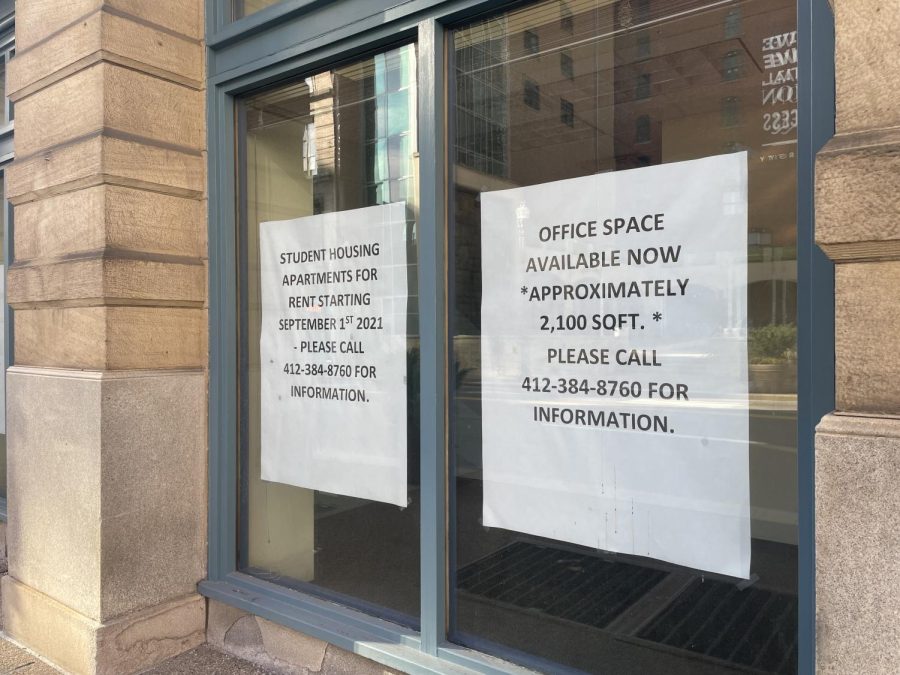University planning to allow local professionals to rent campus spaces
President Don Green seeks to create ‘symbiotic relationships’ between students and renters
Photo by Jake Dabkowski
February 23, 2022
Point Park University President Don Green is seeking to consolidate space on campus, which would involve allowing local working professionals to rent certain areas in university buildings.
The plan is relatively new, and the administration is still developing a timetable on when it will start, determining what specific rooms and buildings would be affected, and addressing other logistical concerns. Point Park, as of the Fall 2021 semester, had 16 buildings and other affiliated sites.
“Like most organizations across the country, if you have some back-office functions where people don’t need to be on campus every single day, then you have the ability to consolidate some space like hotelling offices,” Green said.
“Hotelling” offices is essentially a professional form of subletting property among different businesses or organizations. This decision comes as the university is permitting more employees who are not “student-facing” to work from home indefinitely in some capacity, freeing up offices on campus. According to Green, Point Park is no stranger in experiencing the later-stage impacts of the coronavirus pandemic, namely a significant cultural shift in employees wanting to decide where they are working.
“We’re sort of working on some flexibility. Might there be departments that are gone 5 days a week? Sure, but they would have to be back-office, not student-facing in any way,” Green said. “And then for other ones that are student-facing, might there be some flexibility? Yes, but we need to make sure that there’s someone at desks, at offices, every day of the week so that we are available to students. That’s extremely important to us.”
The names of departments that could be working completely remotely or engaging in hybrid work could not be immediately provided, as the university is still in discussion with managers on these potential changes.
With university employees — and workers in general across the city and country — still working from home, Green said that simply selling leases to currently under-utilized and empty spaces would not be wise from a financial standpoint with far fewer buyers than pre-pandemic. In the current plan, outside working professionals in the Pittsburgh area would be sharing the spaces alongside students, staff and faculty.
“…we want to provide opportunities for students to enhance their career,” Green said. “So what I want to do is look for symbiotic relationships with companies that want to have a presence in downtown Pittsburgh and want to have a relationship with a supply chain of really talented students who want to have a job opportunity, a career opportunity with those very same employers.”
Green and Managing Director of Marketing and Public Relations Lou Corsaro said that the university will first start this initiative by contacting companies with which Point Park has “existing relationships” and expand from there. The Physical Plant, in the meantime, will be assessing which spaces to be designated for renting. There will also be additional steps before professionals start renting and working in campus buildings.
“I mean, whenever you’re constructing a contract for being on campus, if you’re an outside company or you’re renting a space, you have to go through a vetting process through procurement here that ensures that there are certain parameters met. So there is a contractual process that we have to go through that is complicated, and that’s different people coming in,” Corsaro said. “For example, like just in terms of renting space. If you’re going to rent a space on campus, you have to recognize that we have students who are under the age of 21. So you have to adhere to certain guidelines for that. People that are going to be on campus have to be vetted to make sure that they’re good to be around minors, because sometimes kids are still 17 maybe when they start and haven’t turned 18 yet. So there’s a lot of there will be a lot of things that go into it.”
Point Park has had its fair share of building changes in the last year. Since the fall semester, Pioneer Hall, formerly a residence hall on campus, was no longer an option offered to students. The Center for Media Innovation (CMI) will be making a cross-campus move to West Penn after the end of this calendar year. With the extensive steps this kind of plan will take, and the impact it will have on campus, Green said to not expect definitive details on the consolidation project until the end of the spring semester or even later.
“We didn’t want to make a bunch of changes during the semester and potentially impact student service,” Green said. “We’re kind of trying to line these things up and go about this gradually, so you’re going to see far more of those changes happening in summer. But I think that we’ll know [which buildings and rooms are affected] by the time you get to the end of the semester.”



















